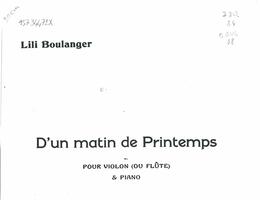D’un soir triste et D’un matin de printemps
Shortly before she died, Lili Boulanger composed two pieces, D’un soir triste and D’un matin de printemps (1917-1918), which can only be fully understood when taken together (although they can be performed separately). Like the title of one of her songs, Elle est gravement gaie (She is solemnly gay), they represent the two psychological aspects of her character. Despite their contrasting nature, the two pieces share the same three-beat rhythm, the same modal harmonic colour and, especially, the same melodic theme. Lili Boulanger orchestrated them shortly after their composition. These were the last works she was able to write without the help of her older sister Nadia.
D’un matin de printemps, for violin (or flute) and piano, is one of the few pieces of a slightly optimistic nature in Lili Boulanger’s output. Its theme – the same as that of D’un soir triste –here takes the form of a lively dance, romping along over richly resonant repeated chords, quite reminiscent of Debussy. A quieter passage follows, “mystérieux, expressif, rubato”, in which the violin trills, while the piano sounds chords. The violin then launches into a sweeping, lyrical melody that is echoed by the keyboard with charming, complex – perhaps even decadent and (if one looks closely) surprisingly bold – harmonies. The main theme reappears in its original form, then with elegiac variations, in the manner of a musical box, before a very forceful final statement.

